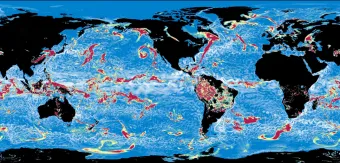
Earlier this week, climate science was recognised in the announcement of the Nobel Prize in Physics 2021, when a share of the prize was jointly awarded to Klaus Hasselmann and Syukuru Manabe.
The Prize was for ‘ground-breaking contributions to our understanding of complex systems” and for “the physical modelling of Earth’s climate, quantifying variability and reliably predicting global warming”.
Celebrating the award in the area of physics, Dr Joel Hirschi and Dr Bablu Sinha, part of the Marine Systems Modelling group at the NOC said: “This week’s announcement of the winners of the Physics Nobel Prize is a landmark moment for the recognition of climate science. The pioneering work of Klaus Hasselmann and Syukuru Manabe laid the foundations of our understanding of how sensitive our climate is to greenhouse gas emissions and how we can distinguish the “fingerprint” of anthropogenic climate change from natural climate variability. The work of both scientists also highlights the importance of the ocean’s role in climate. Hasselmann’s theoretical considerations showed how the ocean provides a “memory” to the climate system by integrating the effects of the chaotic weather systems responsible for our day-to-day weather, thus reconciling unpredictable short time weather fluctuations with a climate system which reacts in a predictable way to anthropogenic perturbations.”
“Manabe and his team were the first to use computer models with realistic configurations to demonstrate that climate change could cause irreversible changes in the state of the ocean circulation once a critical threshold is reached. Today’s sophisticated climate models are direct descendants of Manabe’s, whilst Hasselmann’s paradigm of ocean memory is now the textbook “null hypothesis” for how the ocean and atmosphere interact with each other.”
“Giorgio Parisi’s work explains fundamental behaviours of complex physical systems (of which the climate system is a prime example) on scales ranging from atomic to planetary. Parisi’s, Manabe’s and Hasselmann’s science has in common that it uses mathematics and computer modelling to predict the behaviour of seemingly chaotic systems in nature.”
Professor Ed Hill, Chief Executive of the NOC said: “It is great to see oceanographer and climate modeller Klaus Hasselmann take a share in 2021 Nobel Prize for Physics. His work which has enabled us to understand how to separate short term weather from climate, not least due to the memory provided by the ocean and to separate the fingerprints of human-induced and natural change.”